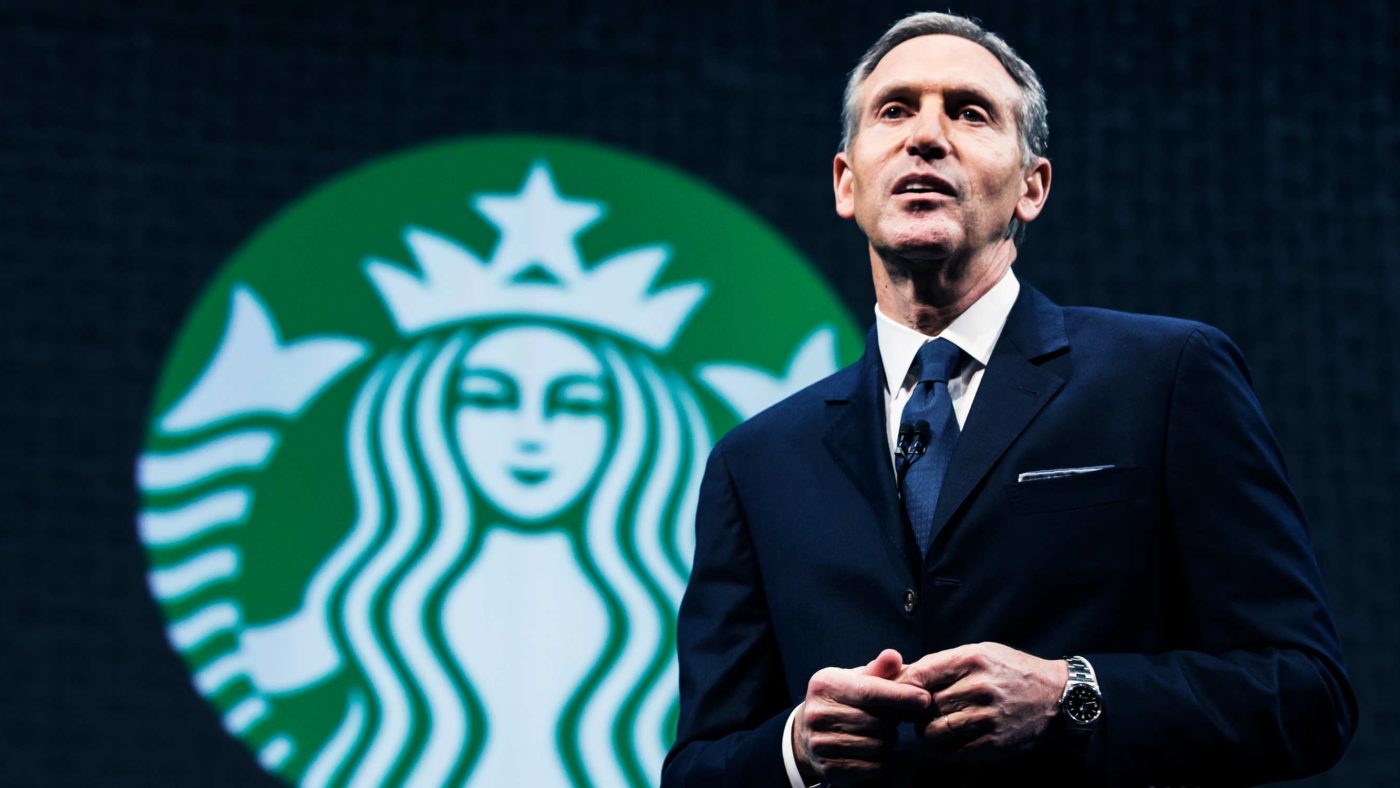In the Age of Trump, just about the last thing the American republic needs is another rich man running a vanity campaign to become the next president of the United States. Such, however, seems to be its fate. At least this time the putative candidate in question — Howard Schultz, the former CEO of Starbucks — is both legitimately rich and, mercifully, not Michael Bloomberg whose quadrennial flirtations with a doomed presidential run have become more tiresome than they could ever be worth.
Schultz suggests he may run as “a centrist independent, outside the two party system” which is enough to ruin his chances even in an era in which neither party commands the loyalty or respect it once did. “I am not a Democrat” Schultz says, “I don’t affiliate myself with a Democratic party who [sic] is so fr left, who basically wants the government to take over health care, which we cannot afford, the government to give free college to everybody and the government to give everyone a job, which is basically $40 trillion on the balance sheet of $21.5 trillion. We can’t afford it.”
That, as you might imagine, is enough to earn him the scorn of Democrats who fear, with some reason perhaps, that an independent candidacy increases the already grimly high likelihood Trump may secure a second term.
Be that as it may, at least Schultz has done something useful. Starbucks is no longer a fashionable company; its ubiquity and the legion of imitators it spawned has seen to that. But it once seemed revelatory and its success is a useful demonstration of capitalism’s success.
I remember the first time I heard of Starbucks and I remember, too, how it changed my world. If this seems an extravagant claim to make for a company that merely sells coffee, I invite you to cast your memory back to the early 1990s before Starbucks changed the way we drank, and indeed, thought about coffee. The United Kingdom was not a coffee place, back then. We were not France and nor were we Italy. A tolerable cup of coffee was hard to find. Of course coffee shops existed but most of them were dreadful, serving something only vaguely related to the coffee you might find, and take for granted, in Paris or Rome. We were as bad with coffee as the Americans still are with tea.
Starbucks, more than any other company, changed that. Now, according to the British Coffee Association, Britons drink around 95 million cups of coffee every day. This is less than in some countries — notably Scandinavia — but still represents a sea change in consumer habits. And much of it is due to Starbucks.
I was an undergraduate in Dublin when I first heard of Starbucks. The Irish capital, like most British cities 25 years ago, was to all intents and purposes a coffee desert then. But a friend had spent the summer vacation working in San Francisco and he brought back with him a suitcase full of Starbucks coffee beans along with tales of what, for the first time, we understood to be something called “coffee culture”. I distinctly recall how revelatory this seemed. It seemed chic and sophisticated, a sign of progress emanating from a superior and more advanced civilisation. Why, we wondered, couldn’t we have something like this?
In time, of course, we did. Starbucks became an international phenomenon and, by doing so, created a new market for a new way of drinking coffee. New vocabulary was required — latte, americano, macchiato — and suddenly it seemed as though there was a Starbucks on every corner. This was sensible; no-one would walk a mile just for a cup of coffee, not even a better one than the black gruel previously available on the British high street, but the presence of multiple Starbucks franchises within a designated city centre zone both advertised the brand and increased demand for its products. A similar pattern may be seen in the expansion of chains such as Greggs and Pret A Manger; convenience requires multiple, competing, outlets. Flood the zone, if you will.
Now it is fashionable to sneer at Starbucks. The coffee, once recognised as a marked improvement on what was available before, is disparaged as being bitter or tasteless or inadequate in any one of a number of different ways. That is the proof of Starbucks’ success. You are free, and indeed able, to complain about the quality of its product because of Starbucks.
In that respect, the company is a shining example of how capitalism and the market is supposed to work. A new product creates a new market and is in turn — for some, anyway — superseded by other competitors offering, in this case, smaller, independent, more innovative and interesting, coffee served in a less “corporate” environment. Innovation inspires emulation and then, in turn, the original innovator begins to look cumbersome and outdated. But your local independent artisan coffee shop selling coffee sourced form a single Indonesian estate only exists because of Starbucks and the corporate muscle it flexed to create the very market upon which smaller competitors can piggy-back. This, again, is the way the system is supposed to work. The rising tide, in this instance, really has lifted all boats.
That is something for which we should be grateful. The market, often disparaged these days, can still work. Howard Schultz will not be, and probably should not be, the next American president but the company he led has done us all some service even if its triumph remains incomplete. After all, 80 per cent of the coffee drunk in the United Kingdom is instant coffee.
CapX depends on the generosity of its readers. If you value what we do, please consider making a donation.


